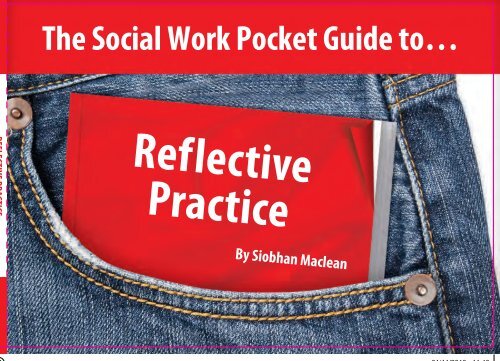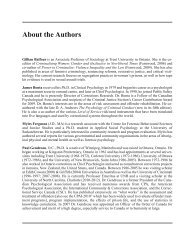Reflective Practice - de Sitter Publications
Reflective Practice - de Sitter Publications
Reflective Practice - de Sitter Publications
Create successful ePaper yourself
Turn your PDF publications into a flip-book with our unique Google optimized e-Paper software.
Contents List...What?What is reflection?...................................................................................................................... 8What is reflective practice?...................................................................................................10What is critical reflection?.....................................................................................................11What is reflexivity?...................................................................................................................12What are the origins of reflective practice?....................................................................14Dewey’s five states of thinking............................................................................................174Why?Why is reflective practice important to social work?...................................................20Professionalism and reflection............................................................................................22Learning and reflection..........................................................................................................26Korthagen’s reflective onion................................................................................................42Forms of reflection...................................................................................................................44Single loop and double loop learning..............................................................................46Improving practice..................................................................................................................50<strong>Practice</strong> learning and reflective practice.........................................................................52Ethics and reflective practice...............................................................................................54Emotional intelligence and reflective practice..............................................................56Why do social workers find reflective practice difficult?............................................585
Why is reflective practice important to socialwork?It is generally agreed that reflective practice is important in social workbecause:• It is a key aspect of professionalism• It is intrinsically linked with learning and so can enhance professional<strong>de</strong>velopment• It can lead to better social work practice and improved outcomes forservice users• It helps practitioners to explore the basic assumptions un<strong>de</strong>rpinningtheir work and therefore helps to ensure ethical practice• The skills and qualities required for reflective practice are very similar tothe skills and qualities which are nee<strong>de</strong>d for best practice in social work• It improves accountability• Service users <strong>de</strong>serve to work with practitioners who recognise the vitalimportance of the work they do and who make the time to reflect on thisWhy? 21
Professionalism and ReflectionThe ACCESS mo<strong>de</strong>l of professionalism, as <strong>de</strong>scribed by Dean (1995)<strong>de</strong>monstrates how reflection and professionalism are closely linked.A – Autonomy linked with Accountability: Professionals have a level ofautonomy which means that they do not need direction about every actionthey take. They do, however, need to be accountable for the <strong>de</strong>cisions theymake and the actions they take.C – Commitment: Professionals have a level of commitment to their work –Dean <strong>de</strong>scribes the way that a professional should have an allegiance to theclient (service user) and the profession.C – Collegiate: Essentially this means that there should be a group i<strong>de</strong>ntitywithin the profession. Consi<strong>de</strong>ring the <strong>de</strong>velopment of a college of socialwork <strong>de</strong>monstrates the move towards a collegiate sense in social work.Why?E – Education: A profession has an agreed body of knowledge which ispassed on through extensive education. Through extensive education andsubsequent continual professional training.S – Service user driven: A professional is service user centred rather thanfocussed on themselves. Professional standards expressed in statements likeco<strong>de</strong>s of ethics set behavioural standards to maintain the user focus.S – Skills: A professional has specialist skills and takes an interest in expandingtheir skills to ensure that they are up to date and fit for purpose. A professionalalso takes an interest in expanding knowledge and skills within the professiongenerally, recognising that professional practice can always be further<strong>de</strong>veloped.I would argue that it would be impossible for someone to meet the sixcomponents of professionalism outlined in Dean’s mo<strong>de</strong>l unless they werea reflective practitioner. Hence, part of being a professional social worker isbeing a reflective social worker.23
HOW?This section will cover some of the mo<strong>de</strong>ls of reflective practice to help therea<strong>de</strong>r i<strong>de</strong>ntify:• How to be more reflective• How to <strong>de</strong>velop skills in reflective practice• How to <strong>de</strong>monstrate reflective practice• How to write in a critically reflective wayHOW DO I DEVELOP AS AREFLECTIVE PRACTITIONER?69
Critical FriendsFirst introduced by Stenhouse (1975) the i<strong>de</strong>a of a critical friend is that theyare a trusted listener, who acts as an interested sounding board. Stenhouseintroduced the i<strong>de</strong>a for action research, but it has since been exten<strong>de</strong>d as ani<strong>de</strong>a which supports reflective practice. The critical friend in reflective practiceis a person who will listen to the practitioner and ask provocative questionsto prompt <strong>de</strong>eper thinking. The critical friend might use a framework likethe coaching conversation (see page 37), or they might use a set of reflectivequestions such as those posed by McClure (see page 114 & 115)The i<strong>de</strong>a of the critical friend is very important in social work whereconfi<strong>de</strong>ntiality limits the opportunities for discussion about working practiceswith others.There is a limit to what each ofus can achieve unai<strong>de</strong>d.Boud, Keogh and Walker (1985: 36)Research into the use of criticalfriends in medical educationindicates that whilst having acritical friend is useful, it mightbe even more advantageousto be a critical friend tosomeone else in or<strong>de</strong>r to<strong>de</strong>velop reflective practice skills(Dahlgren et al 2006). It mighttherefore be useful for socialwork practitioners to pair up ascritical friends to one another– this regularly happensinformally in social work teams,particularly where practitionersare un<strong>de</strong>rtaking further study.Does mybum lookbig in this?How? 73Yes




